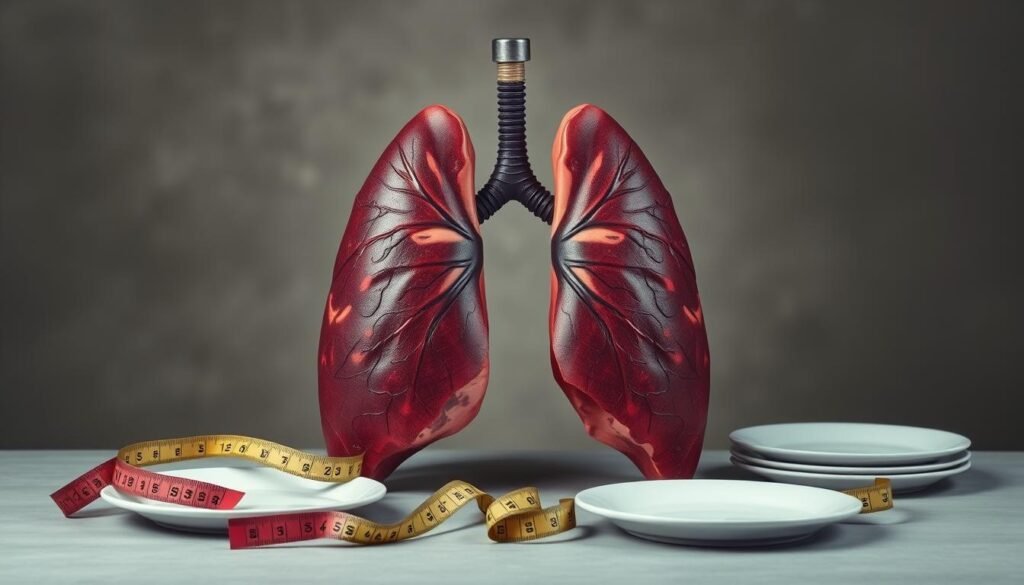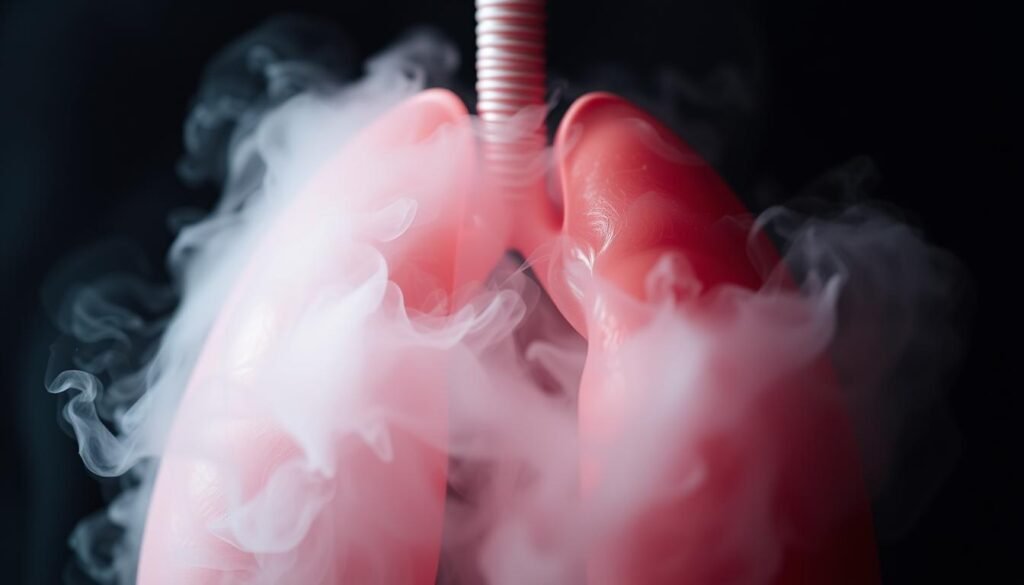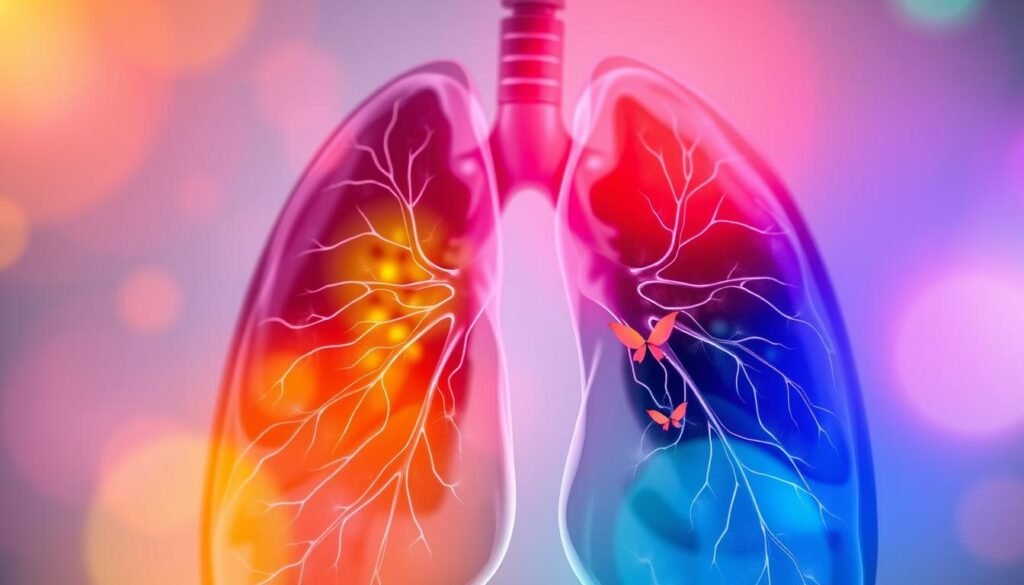Did you know that 34.1% of adults with lung cancer had unexplained weight loss when diagnosed? This shows how important it is to catch lung cancer early. Yet, its symptoms often stay hidden until it’s quite advanced.
Spotting lung cancer signs early improves treatment success. Weight loss linked to lung cancer is a major red flag. Besides weight loss, be alert for ongoing coughs, chest pain, tiredness, and not wanting to eat.
The American Cancer Society says recognizing these signs quickly can make a big difference. It’s a key battle in stopping the world’s leading cancer killer.
Key Takeaways
- Lung cancer often shows no symptoms until advanced stages.
- Unexplained weight loss can be a significant warning sign of lung cancer.
- Common symptoms include persistent coughing, chest pain, and fatigue.
- Early diagnosis improves treatment outcomes for lung cancer patients.
- 34.1% of lung cancer patients report weight loss at the time of diagnosis.
- Regular screenings are essential for high-risk individuals.
Understanding Lung Cancer Symptoms
Lung cancer symptoms differ from one person to another. Recognizing them early is key to successful treatment. Knowing the common signs can greatly impact outcomes.
Common Symptoms of Lung Cancer
Typical symptoms include:
- A persistent cough
- Shortness of breath
- Chest pain
- Unexplained weight loss
People often notice these signs gradually. They may not see obvious symptoms until the cancer is advanced. This fact shows why regular check-ups are essential.
Early Indicators to Be Aware Of
Spotting early signs of lung cancer is critical. Warning signs that need a doctor’s visit include:
- A nagging cough that doesn’t go away
- Fatigue that is unusual or severe
- Recurring bouts of pneumonia or bronchitis
These early symptoms might seem like flu or allergies at first. Knowing them is crucial. It can lead to better management of the disease. For more on early warnings, visit this informative resource.
Lung Cancer and Weight Loss
Lung cancer significantly changes a patient’s health, often causing weight loss. This weight loss can alert us to the disease and make treatment harder. It’s important to understand how lung cancer leads to weight loss.
The Connection Between Lung Cancer and Weight Loss
Studies link lung cancer and weight loss closely. Patients may lose weight without trying, long before they know they have cancer. This happens because the cancer changes the body. It makes the body need more energy, causing weight loss.
Why Weight Loss Occurs in Cancer Patients
Weight loss in lung cancer patients happens for several reasons. Some key factors are:
- Increased metabolic rate: The body uses more energy to fight cancer.
- Loss of appetite: Cancer or treatments can make people not want to eat.
- Cachexia: In advanced cancer, severe loss of muscle and fat occurs, even if you eat right.
- Side effects of treatment: Chemotherapy and radiation can cause nausea and affect eating and digestion.
It’s vital to watch for weight loss in cancer patients. Those who lose weight before treatment often have a harder time surviving. Keeping track of weight can help spot lung cancer early, which is crucial for care.

| Weight Loss Category | Associated Risk |
|---|---|
| 1% – 10% Weight Loss | Lower risk for lung cancer diagnosis |
| 10% – 50% Weight Loss | 2 times higher likelihood of lung cancer diagnosis |
| Significant Continuous Weight Loss (6 months) | Strong association with incident cancer diagnosis |
Knowing the link between lung cancer and weight loss helps. It alerts patients and doctors to act fast. Early action can make a big difference.
Factors Leading to Unexplained Weight Loss
Patients with lung cancer often lose weight without trying. This happens due to many reasons. Knowing these reasons helps in taking care of their nutritional needs.
Potential Causes of Weight Loss in Lung Cancer
Weight loss in lung cancer has various causes. The disease makes cancer cells need more energy. So, the body uses calories faster.
At the same time, the tumor makes substances that mess up normal body functions and hunger signals. This can lead to losing weight quickly, sometimes more than 10 pounds without an explanation.
Impact of Tumor Development on Appetite
Tumors can make eating hard for patients. They might press on the stomach or other parts, causing nausea and feeling full early. This reduces the desire to eat.
Therapies like chemo and radiation add to the problem by causing nausea and changing how food tastes. Stress can also decrease hunger and energy. Dealing with these issues through special nutritional care can improve a patient’s life.
Other Warning Signs to Recognize
Knowing the warning signs of lung cancer can really help with catching it early. Besides weight loss, there are other things to look out for. A constant cough, feeling short of breath, and being tired all the time are big red flags.
Persistent Coughing and Shortness of Breath
If you have a cough that just won’t quit, it could be a sign of lung cancer. This cough often gets worse and may have blood or mucus in it. If you’re also feeling out of breath with this cough, seeing a doctor fast is key. Catching these signs early can help you get the right treatment sooner.
Fatigue and Pain Symptoms Related to Lung Cancer
Feeling super tired, even after resting, is common with lung cancer. This tiredness makes everyday stuff hard to do. You might also feel pain, like in your chest or back, especially if the cancer spreads. It’s really important to get medical help if you have these symptoms, plus a cough or breathlessness. For more tips on early detection, check out this helpful resource.

| Symptom | Explanation |
|---|---|
| Persistent Cough | A cough that continues over time, often worsening and possibly involving blood or mucus. |
| Shortness of Breath | A feeling of not being able to get enough air, often accompanying a persistent cough. |
| Fatigue | An overwhelming sense of tiredness that doesn’t improve with rest, common in lung cancer patients. |
| Chest or Back Pain | Discomfort occurring in these areas if lung cancer has metastasized or advanced in scale. |
Importance of Early Diagnosis and Treatment
Finding lung cancer early is key to better patient results. Getting diagnosed early means there are more ways to treat it, which can lead to living longer. There are many ways to diagnose it early, showing why it’s important for those at risk.
Benefits of Recognizing Early Symptoms
Noticing symptoms early can change how lung cancer is treated. Early detection lets patients explore several treatments, like surgery. Screenings, especially yearly ones with low-dose CT scans, are vital for high-risk people. They can lower the chance of dying from lung cancer by 20%.
This way of prevention means patients get help fast and effectively, making treatment more successful.
How Early Detection Improves Outcomes
Research makes it clear: finding lung cancer early can save lives. The chances of successful treatment are highest in the early stages. Using low-dose CT scans helps avoid the dangers of finding it too late.
Knowing their options and acting quickly allows patients to make better health choices. That’s why anyone with worrying signs should see a doctor right away. For deeper insights into early detection of lung cancer, check this article.

Screening Recommendations and Guidelines
Lung cancer screening is key for early detection and treatment. The U.S. Preventive Services Task Force highlights the need to follow lung cancer screening guidelines. These are for people with a big smoking history.
Who Should Get Screened for Lung Cancer?
The American Cancer Society says people 50 to 80 years old need yearly screenings. They should get a low-dose CT (LDCT) scan if they smoked one pack a day for 20 years. It’s important for those who’ve quit smoking to still get screened. The risk for lung cancer goes down over time after quitting.
Current NCCN and ASCO Guidelines
The NCCN and ASCO have screening guidelines. They focus on people between 50 and 80 years old, especially if they quit smoking in the last 15 years. Adding more former smokers to the screening list can help lower lung cancer deaths. Using newer CT scans can also cut down on radiation from screenings.
| Criteria for Lung Cancer Screening | Lung Cancer Screening Guidelines |
|---|---|
| Aged 50-80 | Annual LDCT for those with 20 pack-year smoking history |
| Former smokers | Screening recommended if quit within the last 15 years |
| Health considerations | Stop screening at age 81 or if major health issues arise |
| Insurance coverage | Most insurance and Medicare cover lung cancer screening |
Treatment Options for Lung Cancer
Lung cancer treatment includes different methods based on the cancer type and stage. It’s important to know about treatments like chemotherapy and immunotherapy. These treatments aim for the best outcome and better life quality.
Overview of Chemotherapy Regimens
Chemotherapy is key for lung cancer, especially non-small cell lung cancer (NSCLC). Before surgery, patients with stage II NSCLC might get neoadjuvant therapy to shrink the tumor.
- Common chemotherapy drugs for NSCLC are cisplatin and carboplatin.
- Stage 0 NSCLC might just need surgery, with no chemotherapy or radiation.
- For stages like IIIB, chemotherapy might be combined with therapies like Osimertinib or immunotherapy.
Emerging Treatments: Targeted Therapies and Immunotherapy
New treatments are changing lung cancer care. Immunotherapy is key for tumors with a lot of PD-L1, which helps in response. Targeted therapy attacks cancer’s genetic changes and is often used for advanced cancer.
- Pembrolizumab is an example of a promising immunotherapy.
- Stage IVA or IVB NSCLC might have surgery and/or radiation, but it’s hard to cure the cancer this way.
- Many clinical trials seek new lung cancer treatments, offering hope.
| Treatment Type | Common Use | Examples |
|---|---|---|
| Chemotherapy | For various stages of NSCLC | Cisplatin, Carboplatin |
| Targeted Therapy | Used for widespread cancer or specific mutations | Osimertinib |
| Immunotherapy | Effective for high PD-L1 expression tumors | Pembrolizumab, Durvalumab |
| Surgery | Curable in early stages, supportive in advanced | Lobectomy, Pneumonectomy |
| Radiation Therapy | Often used in small cell lung cancer | Standard radiation, Stereotactic body radiotherapy |
Clinical Trials and Research Updates
Clinical trials are key in making lung cancer treatments better. They explore new drugs and methods to help patients. By comparing new treatments with the current ones, we can see which is more effective.
Latest Clinical Trials in Lung Cancer Treatment
Recent trials offer new hope in fighting lung cancer. They test new treatments along with old ones. This gives patients more choices that could improve their lives and help them live longer. These trials help us understand how best to treat lung cancer.
Clinical trial patients get more check-ups and tests. This helps keep them safe and ensures the study goes as planned. While insurance often covers usual treatments, the trial may pay for the extra costs.
Importance of Participating in Research
Being in a trial means getting access to the latest treatments. Participants learn a lot about their cancer and help improve future treatments. Their involvement might help win the fight against cancer for many people.
| Benefits of Clinical Trials | Considerations |
|---|---|
| Access to new treatments | Potential for increased visits and tests |
| Enhanced patient support | Standard treatment costs covered by insurance |
| Contributions to research | Potential side effects and reactions |
| Opportunity to help future patients | Need for commitment to the study protocol |
Taking part in clinical trials is more than a personal journey. It’s part of a bigger push for better cancer treatments. Every participant helps move us closer to new solutions in healthcare.
Conclusion
Knowing the signs of lung cancer, like sudden weight loss, is key. This sign could mean the cancer is getting worse. Studies show up to 59% of Small Cell Lung Cancer patients lose weight. This is also true for 58% of people in late stages of Non-Small-Cell Lung Cancer. Spotting these signs early can help people get the treatment they need.
Weight loss is more than just a symptom; it can mean the cancer is tough to fight or might not respond well to chemo. Research keeps showing us how crucial it is to catch these signs early. By doing so, we can fight lung cancer more effectively.
Staying aware of your health matters a lot. If you see any big changes, like losing weight without trying, talk to a doctor. For more information, check out this study about weight loss, obesity, and lung cancer. Keeping up with this knowledge can make a real difference for those facing lung cancer.